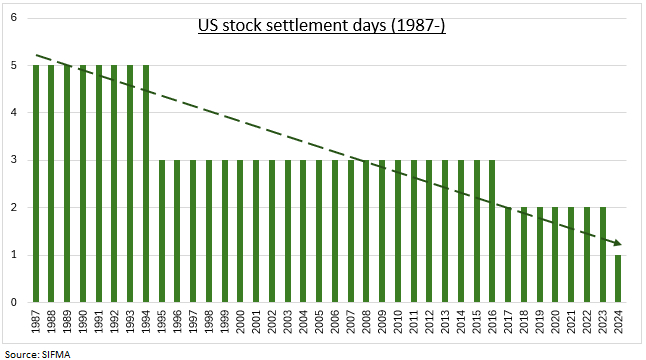CHANGE: US markets are supersized and dominate global stocks, bonds, and currencies. This makes any changes to their underlying market ‘plumbing’ disproportionately important. On May 28th US stocks move to a quicker T+1 settlement schedule, putting it at odds with Europe. Whilst consultation has opened on a long shot move to 24/7 trading. It’s a test, and potential volume win, for NYSE owner Intercontinental Exchange (ICE (NYSE:ICE)), NASDAQ (NDAQ), and derivatives juggernauts CME Group (NASDAQ:CME) and CBOE Global Markets (CBOE). The wider US broker dealers & exchanges ETF (IAI.US) is up 21% the past year, in line with the S&P 500 rally.
T+1 SETTLEMENT: The world is on a tech-driven march to instantaneous trade settlement. US cash equities settlement will move from a two-day to one-day (T+1) settlement on May 28th. This has been progressively shortened from T+5 over the past forty-five years since the 1987 Black Monday crash (see chart). This will cut the counterparty and margin risks highlighted by the 2021 meme stock boom and should boost market liquidity. But will also put the US out of synch with much the rest of the world that is on T+2 and potentially increase the operational risk of failed trades in short term. Though lagging pace-setters China (T+0) and India (T+1).
24/7 TRADING: Regulators are considering an NYSE application to trade 24/7. Prompted by crypto markets trading 24/7, extended hours stock trading, and others from futures to currencies trading around the clock. This would be the greatest ever change since the move to continuous six-day US stocks trading in 1871. The NYSE moved from working Saturdays to its five-day trading week in 1952 and closed on Wednesdays in 1968 to catch up on paperwork. Trading 24/7 may come with costs and complexity. But could benefit volumes, especially from retail investors that dominate out-of-hours activity. And with welcome tighter regulatory oversight.
- English (USA)
- English (India)
- English (Canada)
- English (Australia)
- English (South Africa)
- English (Philippines)
- English (Nigeria)
- Deutsch
- Español (España)
- Español (México)
- Français
- Italiano
- Nederlands
- Português (Portugal)
- Polski
- Português (Brasil)
- Русский
- Türkçe
- العربية
- Ελληνικά
- Svenska
- Suomi
- עברית
- 日本語
- 한국어
- 简体中文
- 繁體中文
- Bahasa Indonesia
- Bahasa Melayu
- ไทย
- Tiếng Việt
- हिंदी
Changes to the super-sized US market structure
Published 25/04/2024, 08:10
Changes to the super-sized US market structure
Latest comments
Loading next article…
Install Our App
Risk Disclosure: Trading in financial instruments and/or cryptocurrencies involves high risks including the risk of losing some, or all, of your investment amount, and may not be suitable for all investors. Prices of cryptocurrencies are extremely volatile and may be affected by external factors such as financial, regulatory or political events. Trading on margin increases the financial risks.
Before deciding to trade in financial instrument or cryptocurrencies you should be fully informed of the risks and costs associated with trading the financial markets, carefully consider your investment objectives, level of experience, and risk appetite, and seek professional advice where needed.
Fusion Media would like to remind you that the data contained in this website is not necessarily real-time nor accurate. The data and prices on the website are not necessarily provided by any market or exchange, but may be provided by market makers, and so prices may not be accurate and may differ from the actual price at any given market, meaning prices are indicative and not appropriate for trading purposes. Fusion Media and any provider of the data contained in this website will not accept liability for any loss or damage as a result of your trading, or your reliance on the information contained within this website.
It is prohibited to use, store, reproduce, display, modify, transmit or distribute the data contained in this website without the explicit prior written permission of Fusion Media and/or the data provider. All intellectual property rights are reserved by the providers and/or the exchange providing the data contained in this website.
Fusion Media may be compensated by the advertisers that appear on the website, based on your interaction with the advertisements or advertisers.
Before deciding to trade in financial instrument or cryptocurrencies you should be fully informed of the risks and costs associated with trading the financial markets, carefully consider your investment objectives, level of experience, and risk appetite, and seek professional advice where needed.
Fusion Media would like to remind you that the data contained in this website is not necessarily real-time nor accurate. The data and prices on the website are not necessarily provided by any market or exchange, but may be provided by market makers, and so prices may not be accurate and may differ from the actual price at any given market, meaning prices are indicative and not appropriate for trading purposes. Fusion Media and any provider of the data contained in this website will not accept liability for any loss or damage as a result of your trading, or your reliance on the information contained within this website.
It is prohibited to use, store, reproduce, display, modify, transmit or distribute the data contained in this website without the explicit prior written permission of Fusion Media and/or the data provider. All intellectual property rights are reserved by the providers and/or the exchange providing the data contained in this website.
Fusion Media may be compensated by the advertisers that appear on the website, based on your interaction with the advertisements or advertisers.
© 2007-2024 - Fusion Media Limited. All Rights Reserved.
